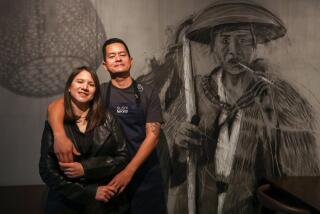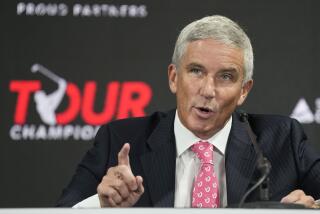As New Resort Owners, Father-Son Team Has Come to the Fore : Resorts: As it upgrades La Costa’s already plush facilities, Sports Shinko is expanding. Worldwide assets are estimated to be $3 billion to $4 billion.
- Share via
As he prepared to tee off on the final hole of the pro-am event that preceded the recent MONY Tournament of Champions, Toshio Kinoshita was asked how his golf game was progressing.
“About as good as my English,” quipped the 62-year-old president and founder of Sports Shinko Co., the giant Japanese company that owns the 420-acre La Costa Hotel and Spa, site of the 38th annual tournament.
Seemingly proving his point with obvious embarrassment, Kinoshita’s drive missed the fairway, sheared a stem from a nearby cluster of reeds and dropped into heavy rough. But he recovered impressively and finished with a broad smile.
“He’s 10 times better than last year,” his caddy said. “His game has improved so much.”
Kinoshita’s playing partner, paired with him in 1989 as well, had a simple explanation.
“He’s turned the business over to his son,” said James B. Farley, the chairman and chief executive of MONY. “Now he’s concentrating on his golf lessons.”
Kinoshita acknowledged that he has, indeed, focused more on golf lately, but he’s still far from a man of leisure despite appointing his second-oldest of three sons, Takeshi, president of the resort last June.
Tak--as he likes to be called--said he is “overseeing” the operation of the sprawling complex that includes two 18-hole golf courses, 23 tennis courts, eight restaurants (one more than a year ago), a movie theater, a 60,000-square-foot spa, a 50,000-square-foot conference center and 480 rooms with daily rates that range from $190 to $1,800.
Reserved and rail-thin at 28, the likable young executive, who earned a master’s degree in business administration from Lynchburg College in Virginia, is working closely with San Diego-based Global Hospitality Corp., which manages the resort.
“We want to improve services and the existing facilities,” said Tak, who speaks excellent English but chooses his words sparingly, particularly in the presence of his father.
The elder Kinoshita--whose company purchased the complex in November, 1987, for $250 million--remains the dominant figure at La Costa, the man who approves the budget and virtually everything else.
“Mr. K has been great about that (spending money),” said Paul James, Global’s managing director. “He wants to maintain La Costa as the premiere resort in the world. There is no doubt.”
Nine golf greens have been rebuilt since the Japanese took over, and six more will be rebuilt this year at about $15,000 each, James said.
Meanwhile, major improvements are planned for 101 guest rooms adjacent to the spa and surrounding the pool, and the spa itself is expected to be renovated within the next year or two, James added. The hotel had undergone a two-year, $100-million-plus renovation just before it was sold.
The owner still doesn’t anticipate a profit for three or four years, he said through an interpreter, “but we are right on track.” Room occupancy figures were up slightly last year, from a 65% average to about 70%.
Thus far, young Kinoshita has had little opportunity to take an active role at La Costa--and almost no time for golf, he said somewhat regretfully.
“I am also in charge of international operations for Shinko,” he added. “My father keeps me busy. I have to travel frequently to Japan, the East Coast and Europe.”
Sports Shinko has expanded its business impressively during the past year.
In February, the company paid $9 million for a shopping center adjacent to the resort. The center includes a supermarket, banks, boutiques, gas station, travel agency, professional offices and a gourmet restaurant--the Pisces, a favorite among hotel guests.
A search is under way to acquire additional properties--”hotels, country clubs or just land”--in coastal areas near Los Angeles and farther north, possibly in the Carmel-Monterey area, Toshio Kinoshita said.
However, building golf courses and resorts in Japan remains Sports Shinko’s top priority.
Two new large golf complexes are under construction--Shinko’s 29th and 30th courses in that country--and the firm acquired locations for six more, making a total of 21 undeveloped properties.
“Year by year, it becomes more difficult to build golf courses (in Japan),” Toshio Kinoshita continued. “One reason is the limited space of land usage, also government restrictions.”
Nonetheless, Japan is enjoying what Kinoshita called its third “golf boom.” As an example of the sport’s expanding popularity there, he cited the increase in membership fees at one of his clubs--from about $30,000 two years ago to a current offering of about $700,000.
Sports Shinko--which owns three courses at the Grenlefe Resort near Orlando, Fla., and one each on the islands of Oahu, Maui and Kauai--expects to build another on the Big Island of Hawaii.
“We are negotiating now,” Toshio Kinoshita said. “We expect to finalize that within the year.”
In December, Sports Shinko acquired the 15-story, 62-room Diamond Head Beach Hotel on Oahu from an Australian company for $13.5 million, Kinoshita continued. That made seven now owned by the Japanese firm. And “negotiations for two other hotels in Honolulu should be finalized within a month or two,” he added.
Elsewhere in the world--New York, Spain, West Germany--Sports Shinko is moving aggressively to acquire other properties, also including land near Sydney, Australia, where professional golfer Greg Norman will design a course.
Asked to estimate Sports Shinko’s assets, the elder Kinoshita and the company’s general manager, Tsugio Fukuda, conferred for a lengthy time in Japanese, made notes, conferred again, then settled on a figure--$3.5 billion to $4 billion, Fukuda said, “with a working capital of close to $250 million.” A year ago, assets were reported at $2.7 billion.
“Of course, that includes the market value increase and inflation of real estate,” he added.
“Yes,” Kinoshita concluded with a smile, “it is a very good business.”
More to Read
Inside the business of entertainment
The Wide Shot brings you news, analysis and insights on everything from streaming wars to production — and what it all means for the future.
You may occasionally receive promotional content from the Los Angeles Times.










